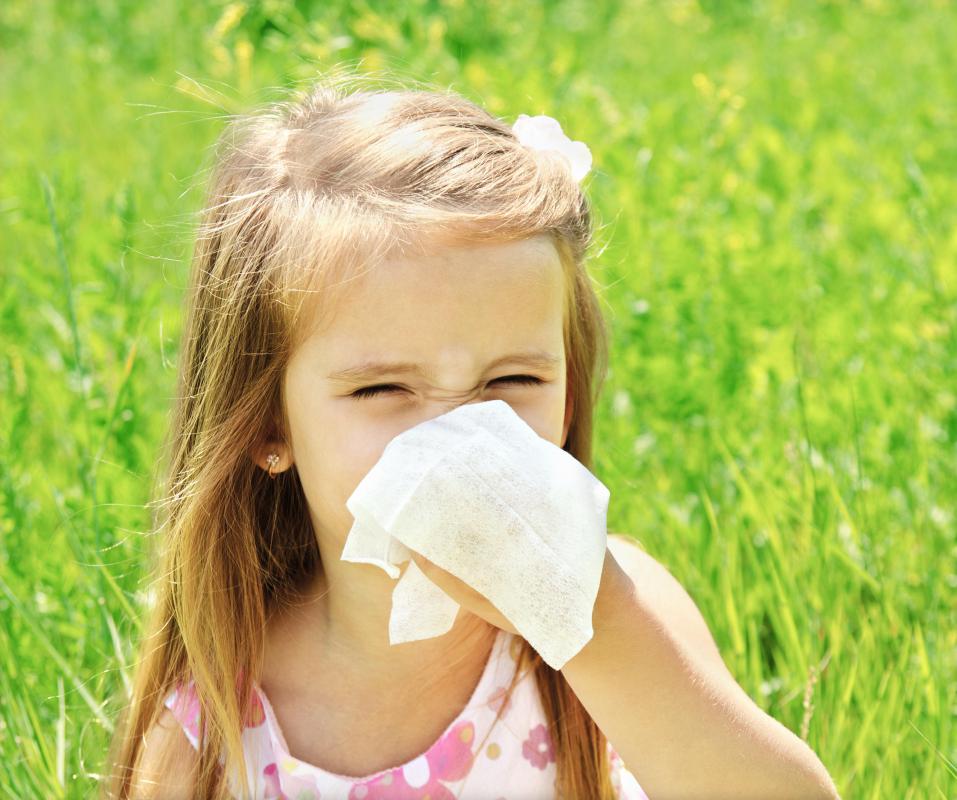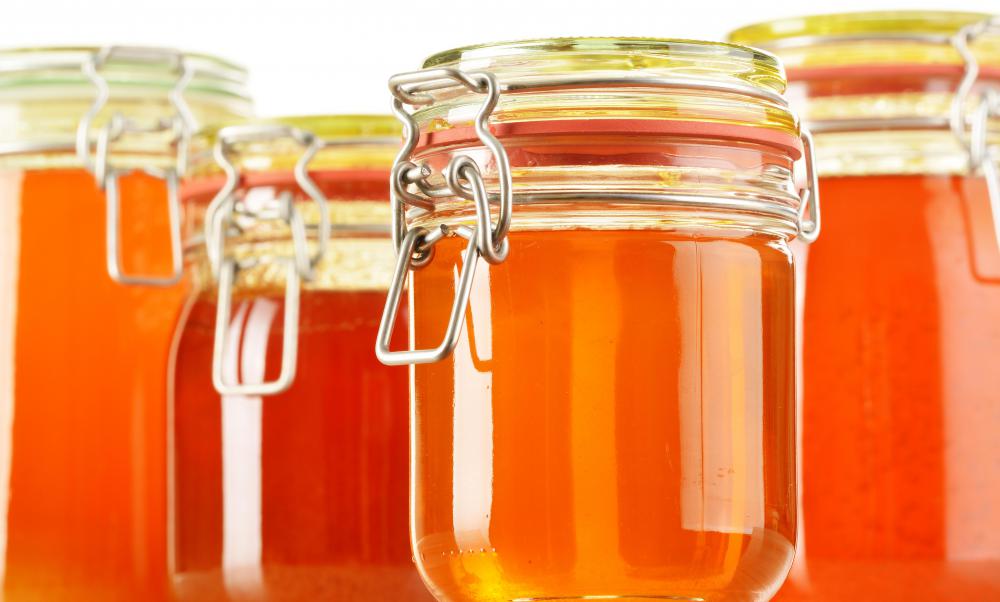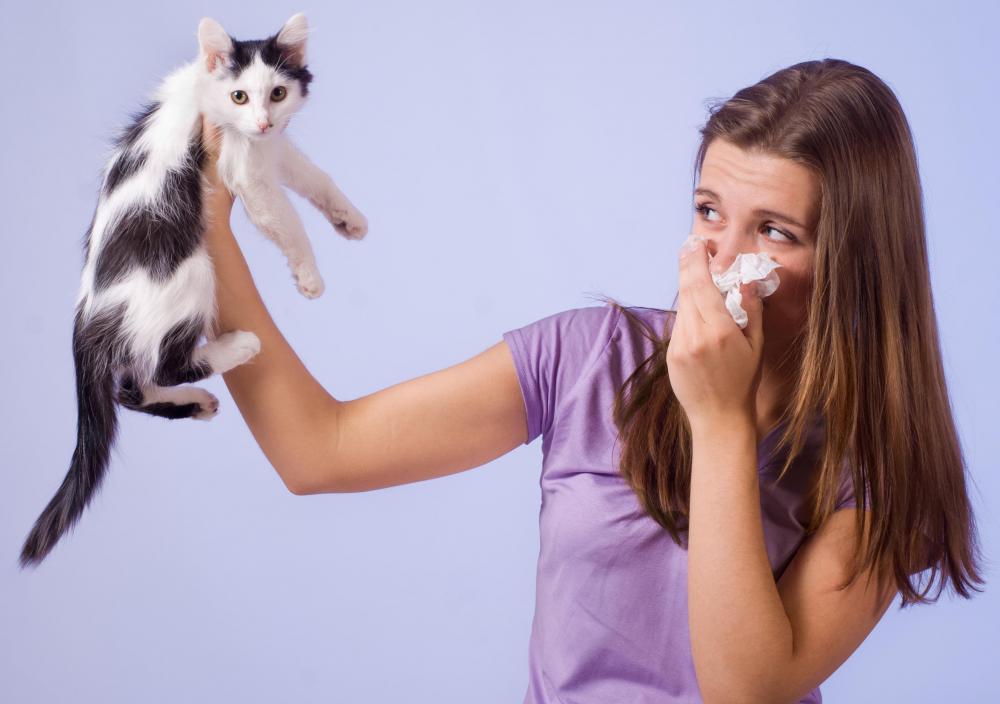At WiseGEEK, we're committed to delivering accurate, trustworthy information. Our expert-authored content is rigorously fact-checked and sourced from credible authorities. Discover how we uphold the highest standards in providing you with reliable knowledge.
Is It Possible to Prevent Allergies by Eating Honey?
There is a great deal of speculation as to whether you can prevent allergies by eating honey. From a purely clinical standpoint, there is little evidence to support this idea. Anecdotal evidence ranges from complete support of the idea and testimonials to its success, to the many who have tried it and found it doesn’t work. Part of the reason for this conflicting information is that people are allergic to many different things, so honey might be effective for one allergen but not another.
The theory behind eating honey — generally raw, local honey from no more than 50 miles (80.47 km) away — is that if a person consumes pollen in the honey, he or she will gradually build up a tolerance to plants that are likely to cause hayfever. A similar remedy of eating honeycomb was popular in the 1970s, but hasn’t gained much in popularity since then. Someone who is allergic to dust mites or cat hair probably won’t solve the problem by eating honey, because it doesn't desensitize a person to such allergens in this way.

There are a few holes in the theory of honey working as a desensitizing agent. First, when an allergist gives allergy shots, he or she does so in extremely low doses, so that the patient gradually builds a tolerance to allergens. Honey, on the other hand, can contain relatively large amounts of pollen, generally much more than a person would be exposed to if he or she spent an hour or so outdoors. A person who is severely allergic to pollen might have an anaphylactic reaction to eating honey, though this is extremely rare. Alternately, honey simply might worsen the person's allergies. Others report no worsening of allergic response, but also no improvement in symptoms.

This had led to the theory that feeding honey to young people might help them avoid allergies later in life. In other words, exposure to large amounts of pollen present locally at an early age could desensitize people before they have a chance to really develop an allergic reaction. The problem here is that adults should never give honey to children under the age of 12 months, since it contains botulism spores, even when cooked, that can transmit the bacteria to babies. The risk is far too great and young children far too vulnerable to try this method for preventing allergies.

Feeding honey to older children might help, but it would require the children to live in the same location, or within 50 miles (80.47 km) of it, for the rest of their lives. People are often much more mobile than they once were, so this is not a scenario for most people. So while a child might have a tolerance to some pollens, he or she will still likely be affected by others that aren’t local. If the parent gives the child honey that's not local, then the child could still be allergic to local pollens.

Even though it is probably not possible to prevent allergies by eating honey, the substance does have some health benefits. It can be soothing to sore throats and help calm coughs. Honey is also helpful in providing “good” bacteria for the gut and can help with certain digestive problems. Some studies show that honey applied to burns may accelerate skin healing. Of course, many people find local honey to be a tasty addition to their diets, so as long as an allergist or other medical professional gives his or her approval, there's probably no harm in trying to treat allergies with it.
AS FEATURED ON:
AS FEATURED ON:















Discussion Comments
My mother had severe allergies to so many things when I was younger. She worked for an allergist, who finally recommended eating honeycomb as a last resort. She had taken shots for years! The result of a teaspoon twice a day for a few months? No more hay fever, until much later in life.
I have had such bad hay fever the past few seasons, I finally decided to try the honeycomb this year. Don't know results yet, but I am a firm believer. It must be local honey, so you get the pollen in your area. Just chew until you can't anymore and spit out the rest of the wax. I use homeopathic meds whenever possible! Who cares about research if it works? Try Bio Allers Sinus and Allergy for symptoms. Get it at Vitamin Cottage or Whole Foods. It really works!
One important point that was left out of this article is the relevance of raw honey to people's allergies. Meaning that it's unlikely the pollen bees use to make honey is the same pollen people are allergic to. Most people are allergic to things like ragweed, which isn't found in honey at all, as bees collect pollen exclusively from flowering plants.
Just some food for thought, and just because there haven't been studies on it doesn't make it that much more legitimate or plausible.
Usually, I get major sinus infections, among other pollen allergy problems, especially in the spring. This year the pollen has been worse than it has been in a while and I have had no problems.
The only thing that I have changed is that I eat two peanut butter and honey sandwiches for lunch four to five days a week, and my allergies are not a problem at all. I had not even thought about this as a remedy before, and didn't even think about it until everyone around me was having problems and I haven't been. I was just eating my super fast, easy, and cheap lunch.
Now I'm a full blown believer that honey is the reason I'm not having any more allergy problems.
Well, with so many all over the Internet saying that it worked for them, that's pretty much all the study I need.
"From a purely clinical standpoint, little evidence exists to support that this works."
Not sure if it does work or not, but if it did, I can't imagine that evidence in a clinical setting would be available due to the lack of funding for research in natural cures. This statement is misleading. "Little evidence exist to support that this works" really means little research has been done on this.
You state that a difference is the amount of pollen you get from an injection as opposed to a more significant amount in the honey. taking things orally lessens the amount as it requires processing through your digestive tract first, where an injection is a more direct route. That is why with almost all medications we take a much larger dose when taken orally as opposed to what we would be given if taken as a shot. You also state that some people think this might work if only started at an early age. Is that same theory applied to giving allergy shots? If not, I don't see the connection. I'm thinking of trying this since I have hayfever type allergies and while I can control the symptoms with medication, I'd much rather work on the cause. Honey can't really hurt anyone (except babies under 1) like you said. :)
I find that in the Philadelphia area that if I start a teaspoon of honey a day during the last third of March that I have only mild sneezing and eye-itching only through April, May, and June, when I then stop taking honey until the next March. When we go to our camp in the Adirondacks in May, I immediately would develop allergy symptoms from the local pollen, which I would stop within one day with their local honey that I keep in our camp. Before I learned about using honey, my chest would be so sore from coughing and sneezing that another sneeze/cough would be agony, my eyes would be swollen almost shut, and my nose would be running bloody mucus.
Post your comments